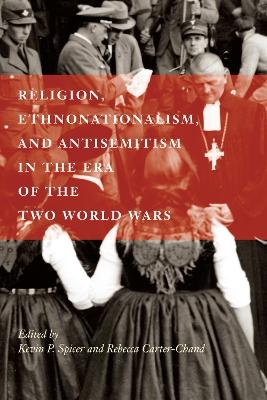
Religion, Ethnonationalism, and Antisemitism in the Era of the Two World Wars
Seiten
2022
McGill-Queen's University Press (Verlag)
978-0-2280-0890-3 (ISBN)
McGill-Queen's University Press (Verlag)
978-0-2280-0890-3 (ISBN)
In the wake of WWI, religious identity and practice became tools for leaders to appropriate as instruments to define national belonging, often to the detriment of those outside the faith tradition. This book places ethnonationalism – a particular articulation of nationalism based upon an imagined ethnic community – at the centre of its analysis.
In the wake of the devastating First World War, leaders of the victorious powers reconfigured the European continent, resulting in new understandings of nation, state, and citizenship. Religious identity, symbols, and practice became tools for politicians and church leaders alike to appropriate as instruments to define national belonging, often to the detriment of those outside the faith tradition.
Religion, Ethnonationalism, and Antisemitism in the Era of the Two World Wars places the interaction between religion and ethnonationalism – a particular articulation of nationalism based upon an imagined ethnic community – at the centre of its analysis, offering a new lens through which to analyze how nationalism, ethnicity, and race became markers of inclusion and exclusion. Those who did not embrace the same ethnonationalist vision faced ostracization and persecution, with Jews experiencing pervasive exclusion and violence as centuries of antisemitic Christian rhetoric intertwined with right-wing nationalist extremism. The thread of antisemitism as a manifestation of ethnonationalism is woven through each of the essays, along with the ways in which individuals sought to critique religious ethnonationalism and the violence it inspired.
With case studies from the United States, France, Italy, Germany, Finland, Croatia, Ukraine, and Romania, Religion, Ethnonationalism, and Antisemitism in the Era of the Two World Wars thoroughly explores the confluence of religion, race, ethnicity, and antisemitism that led to the annihilative destruction of the Second World War and the Holocaust, challenging readers to identify and confront the inherent dangers of narrowly defined ideologies.
In the wake of the devastating First World War, leaders of the victorious powers reconfigured the European continent, resulting in new understandings of nation, state, and citizenship. Religious identity, symbols, and practice became tools for politicians and church leaders alike to appropriate as instruments to define national belonging, often to the detriment of those outside the faith tradition.
Religion, Ethnonationalism, and Antisemitism in the Era of the Two World Wars places the interaction between religion and ethnonationalism – a particular articulation of nationalism based upon an imagined ethnic community – at the centre of its analysis, offering a new lens through which to analyze how nationalism, ethnicity, and race became markers of inclusion and exclusion. Those who did not embrace the same ethnonationalist vision faced ostracization and persecution, with Jews experiencing pervasive exclusion and violence as centuries of antisemitic Christian rhetoric intertwined with right-wing nationalist extremism. The thread of antisemitism as a manifestation of ethnonationalism is woven through each of the essays, along with the ways in which individuals sought to critique religious ethnonationalism and the violence it inspired.
With case studies from the United States, France, Italy, Germany, Finland, Croatia, Ukraine, and Romania, Religion, Ethnonationalism, and Antisemitism in the Era of the Two World Wars thoroughly explores the confluence of religion, race, ethnicity, and antisemitism that led to the annihilative destruction of the Second World War and the Holocaust, challenging readers to identify and confront the inherent dangers of narrowly defined ideologies.
Kevin P. Spicer is James J. Kenneally Professor of History at Stonehill College. Rebecca Carter-Chand is director of the Programs on Ethics, Religion, and the Holocaust in the Jack, Joseph and Morton Mandel Center for Advanced Holocaust Studies at the United States Holocaust Memorial Museum.
| Erscheinungsdatum | 17.12.2021 |
|---|---|
| Reihe/Serie | McGill-Queen's Studies in the History of Religion |
| Zusatzinfo | 13 illustrations |
| Verlagsort | Montreal |
| Sprache | englisch |
| Maße | 152 x 229 mm |
| Themenwelt | Geschichte ► Teilgebiete der Geschichte ► Religionsgeschichte |
| Sozialwissenschaften ► Politik / Verwaltung ► Politische Systeme | |
| Sozialwissenschaften ► Politik / Verwaltung ► Politische Theorie | |
| Sozialwissenschaften ► Soziologie ► Spezielle Soziologien | |
| ISBN-10 | 0-2280-0890-5 / 0228008905 |
| ISBN-13 | 978-0-2280-0890-3 / 9780228008903 |
| Zustand | Neuware |
| Informationen gemäß Produktsicherheitsverordnung (GPSR) | |
| Haben Sie eine Frage zum Produkt? |
Mehr entdecken
aus dem Bereich
aus dem Bereich
Von den Anfängen bis zur Gegenwart
Buch | Hardcover (2022)
C.H.Beck (Verlag)
34,00 €
Herkunft, Blüte, Weg nach Osten
Buch | Hardcover (2024)
C.H.Beck (Verlag)
39,00 €


